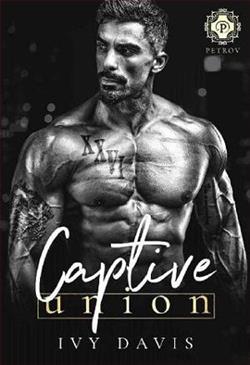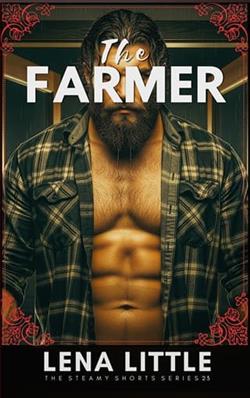Page 47 of The Secret Word
“I’ve seen enough in my life to know that this poor fellow has been through terrible times,” Chris said to Clem, “but he is just the kind who will explode, and anyone could get hurt. You. Our baby…”
Clem put a hand protectively over her womb, which was even now cradling their child, but argued, “He needs us, Fuller said. Can we not give him a space and watch him closely, Chris? If we are careful, surely we can protect the other boys? And if we fail,we can send Eight to Billy, who might be able to help him. What kind of a name is Eight?”
“One given in a workhouse to a baby that is not expected to live,” Chris explained. “It is a sensible solution. I’ll talk to Partridge, and we’ll both talk to Eight.”
The boy would have to start at the beginning. Someone had taught him courteous manners and the elements of hygiene, but he had no schooling at all. Clem wondered where a boy like him might be expected to keep himself clean and be polite, and was horrified when Chris explained the use to which he must have been put.
Eight might have been as young as ten or as old as twelve. He, himself, had no idea, and nor did he have more than the one name. “You can choose another name if you wish,” Clem suggested gently. Eight said that he would think about it. However, a few days later, he shyly suggested that he’d like to name himself after the Duke of Wellington.
A couple of the men who worked in the stables and gardens had served in the wars, and they had been keeping the boys entertained with stories about the great general and his armies.
“Wellington ain’t a name,” scoffed one of the other boys, amending his verb to “is not” after intercepting a stern look from Clem. She didn’t bother to explain she was objecting to his scoffing, not his grammar.
“Arthur, then,” she told Eight. “That is his grace’s Christian name. He is Arthur Wellesley, the Duke of Wellington.”
“Arthur,” the boy repeated. And he chose the name Stone as his surname as a nod to the school. The staff and pupils were delighted. The Duke of Wellington might have been less so, if he ever found out, but that was both unlikely and beside the point.
Chapter Eighteen
The explosion ofanger, when it happened, was from an unlikely source.
Tom Fuller was caught beating up Martin White, the older of the two boys Mrs. Westbridge had rescued from the orphanage. While Partridge had dealt with fighting between the boys by organizing boxing lessons and imposing the Marquess of Queensbury’s rules, this was not sanctioned and it was not fighting. White was down and begging for mercy, but Fuller was continuing to hit him.
“I’m heartbroken,” Partridge told Chris and Clem. “I would never have taken him for a bully.”
“We shall have to let him go,” Chris said. “We cannot allow such brutality.”
“What does Mr. Fuller have to say for himself?” Clem asked, but apparently, Fuller would not defend himself, nor speak on his own behalf in any way. White, too, was tight-lipped, though that might have been because speaking hurt. He was in the infirmary, with a broken arm, possibly cracked ribs, eyes that were swollen shut, a missing tooth, and multiple bruises.
“Besides,” Partridge said, “nothing can excuse such a total lack of control.”
Clem frowned thoughtfully. She like Andrew Partridge, very much. But she had heard enough from Chris about the conditions that boys abandoned to the streets faced that shecould imagine circumstances in which the anger and grief of years of abuse might break out. “Explode,” as Chris put it.
“You predicted this,” she said to Chris. “Not from Tom Fuller, perhaps. But he has wounds, even if he has learned to hide them. They all do, you said. All our street boys. I think we need to know what set him off, if we are to be just.”
Chris couldn’t argue with Clem’s wisdom. So each of the adults spoke to two or three boys, dividing them up. The other boys claimed ignorance, even those who had witnessed what had begun as a fight. The one clue that someone let drop to Mrs. Westbridge was that Martin had been teasing Arthur. “Just pokes and words, like,” said the informant. “And tricks, like. Tripping him. Pushing his cocoa over. Not stuff to get him half-killed.”
“Perhaps not half-killed,” Mrs. Westbridge told the other adults when they gathered to compare notes, “but certainly bad enough to see Mr. White on kitchen duty for months, if not expelled. But why did Mr. Fuller not come to one of us?”
It was a good question, but one to which they could not find an answer, until Clem thought of a possible way to break Arthur Stone’s silence. She took him out with her to the garden, to the berry cage, where the autumn-flowering raspberries needed daily picking.
He had come out of his shell a little in the two months he’d been with them, but—now she came to think of it—she’d noticed a withdrawal in recent days, and now he was as white and as silent as he’d been when he arrived.
“These are the ripe raspberries,” she explained. “To check, put your fingers gently around one that you think is ready, and tug without squeezing. If it falls off in your hand, it is ready.”
The strained look around his eyes eased as he experimented, soon discovering the knack of it.
“Try one,” she invited. “They’re good!” And she had the satisfaction of seeing his eyes open with wonder and a small smile that vanished almost immediately.
“Good?” she asked.
His nod in reply was vigorous.
“You may eat one raspberry for every ten you put in the pail, Mr. Stone,” she said.
For a while, they worked in silence, filling their pails. Arthur relaxed even more, and Clem wished she did not have to break the peace, which was doing the poor boy good. But they had to resolve this situation somehow, and Arthur was the key.
“Mr. Fuller will not tell us what made him so angry at Mr. White,” she commented, keeping her tone conversational. “Unless we discover he had a good reason, we will have to send him away from the school, but he will not tell us, and neither will Mr. White.”















